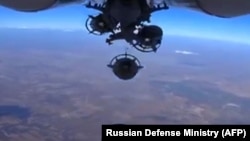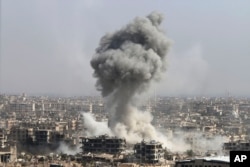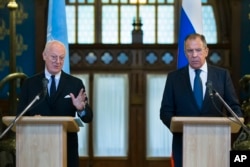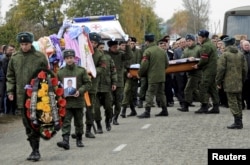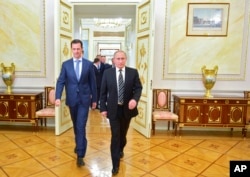The battle between Syrian forces — backed by Russian air power — and rebel fighters played itself out on social media over the course of several hours.
“Reports that Jaysh Al-Fatah has began its long-awaited offensive on Morek,this is going to be decisive,” tweeted Abdel Rahman, a self-described history major with more than 3,300 followers, who goes by the Twitter handle @VivaRevolt.
Several hours later, @NorthernStork tweeted “Strategic Morek is free!”
In the interim, groups like the London-based Syrian Observatory for Human Rights, confirmed reports of fierce fighting in the area, part of a larger rebel counter offensive against the Syrian regime.
Few decisive gains
Whether the rebel forces took or can hold Morek, a town north of Hama along the strategic M-5 highway, Western officials say the fight illustrates the difficulties Russia is facing as it tries to carve out a larger stronghold for Syrian President Bashar al-Assad. Moscow has shown an inability to make decisive gains, despite a clear advantage with air power.
“There has been an increase in Russian air activity this week,” said Operation Inherent Resolve spokesman Col. Steve Warren, adding the Russian-backed forces are meeting with “mixed success.”
“The regime forces in some areas have managed to gain a little bit of ground,” he told reporters from Baghdad Wednesday. “In other areas, they gained ground. They were counter attacked, and lost the ground that they gained.”
The assessment was backed by a U.S. intelligence official, who said the Russian-supported offensive is making “only marginal gains on the ground,” despite the help of Iranian forces and fighters from the Iranian-backed terror group Hezbollah.
'Operational challenges'
The official also suggested that Russia’s efforts to support Assad may be faltering because of unfamiliar conditions on the ground.
“The Russian military is accustomed to operating in an environment with a clear and unified chain of command,” the official said, adding that the lack of such structure is “likely to pose planning and operational challenges.”
Still, pro-Assad forces have been claiming their share of success. Syrian state television said Wednesday the regime’s forces captured a key road to Aleppo from the Islamic State terror group, breaking what had been a two-week-long siege.
Russian officials also said Wednesday their jets had struck more than 200 terrorist targets over the previous 48 hours, taking out a training camp near Aleppo, and underground shelters and other terrorist fortifications in Homs province.
Intelligence officials from within the Middle East are cautioning against any rush to judgment.
“It’s early on in the game to say how effective they [the Russians] have been,” Lahur Talabani, the director of the Kurdistan Regional Government’s intelligence agency, told VOA. “But I think it’s a game changer, with the Russians arriving.”
Talabani, in Washington for meetings with U.S. officials, said the Russians do not necessarily need to strike decisive blows to reach their goals.
“Their support role of Assad is very clear,” Talabani added. “They want to keep him alive and they want to go on strong for the negotiations.”
Growing ground force
Officials also acknowledge that facts on the ground in Syria are prone to change quickly. A U.S. intelligence official noted that while the Russian-backed offensive is “progressing slowly,” Assad’s allies have been steadily applying more pressure since the start of last month.
“The major offensive is only in its infancy,” the official said. “Iranian Islamic Revolutionary Guards Corps troops, as well as Lebanese Hezbollah and other Shia militia fighters, probably did not arrive on the battlefield in greater numbers until mid-October.”
And the growing ground force is sizeable, with intelligence officials estimating there now are likely 10,000 or more pro-Assad troops in Syria. Recent reports suggest the size of the Russian force alone in Syria may have doubled in recent weeks to 4,000 troops.
Some current and former officials warn, however, that Russia’s Syria policy faces a similar shortcoming that has plagued U.S. and Western efforts in the Middle East and elsewhere: Air power alone cannot win a war.
“[Russian President Vladimir] Putin will find in three months, six months, 12 months that the battle tide has turned against Assad, despite his military presence,” said former U.S. ambassador to Ukraine John Herbst, now with the Atlantic Council’s Eurasia Center.
“Then he’s in the difficult position of having to seriously escalate Russian intervention, putting in tens of thousands of Russian troops, or watching his ally go down in defeat despite Russian planes," he said.




